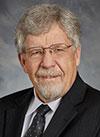
Question
I am becoming much more active on social media. What are the ethical concerns if I do this?
Answer
Several subtle ethical concerns arise when lawyers engage in social media activities. No one rule specifically addresses social media, but rules regarding lawyer advertising and lawyer communications are important to consider. There are several rules that I would highlight to lawyers actively engaged with social media; I address a few below.
 Dean R. Dietrich, Marquette 1977, is the president-elect of the State Bar of Wisconsin. He is with the law firm of Weld Riley S.C., Wausau, and is past chair of the State Bar Professional Ethics Committee.
Dean R. Dietrich, Marquette 1977, is the president-elect of the State Bar of Wisconsin. He is with the law firm of Weld Riley S.C., Wausau, and is past chair of the State Bar Professional Ethics Committee.
The first area is lawyer communication. The Rules of Professional Conduct require lawyers to keep all information about a client confidential unless specific permission is given to disclose the information or disclosure of the information is impliedly authorized to further the interests of the client. See SCR 20:1.6(a). This rule places a significant burden on lawyers to ensure the confidentiality of client information.
The Supreme Court Rules also address communications by lawyers about the services they provide. SCR 20:7.1 pertains to communicating about a lawyer’s services and provides as follows:
SCR 20:7.1 Communications concerning a lawyer’s services. A lawyer shall not make a false or misleading communication about the lawyer or the lawyer’s services. A communication is false or misleading if it:
(a) contains a material misrepresentation of fact or law, or omits a fact necessary to make the statement considered as a whole not materially misleading;
(b) is likely to create an unjustified expectation about results the lawyer can achieve, or states or implies that the lawyer can achieve results by means that violate the Rules of Professional Conduct or other law; or
(c) compares the lawyer’s services with other lawyers’ services, unless the comparison can be factually substantiated; or
(d) contains any paid testimonial about, or paid endorsement of, the lawyer without identifying the fact that payment has been made or, if the testimonial or endorsement is not made by an actual client, without identifying that fact.
Under this rule, lawyers must be very careful regarding communications on social media that address the services provided to clients. Making statements that are misleading can create a significant problem for lawyers. The ABA Comment to the rule states that “[a] truthful statement is misleading if it omits a fact necessary to make the lawyer’s communication considered as a whole not materially misleading. A truthful statement is also misleading if there is a substantial likelihood that it will lead a reasonable person to formulate a specific conclusion about the lawyer or the lawyer’s services for which there is no reasonable factual foundation.”
Although the use of social media to communicate about services the user provides has become very commonplace, there has been little activity in the oversight of lawyer statements. But the failure to include all necessary information for a statement to be reasonably understood by a person who reads or hears the statement could result in a lawyer getting in trouble.
Lawyers often use social media to solicit clients for their law practices. SCR 20:7.3, titled “Solicitation of clients,” states that a lawyer may not use in-person or live telephone or real-time electronic contact to solicit clients. Merely posting to social media would not constitute real-time electronic content, but a lawyer must not solicit clients by using electronic communication (email) or in-person or telephonic communication if the lawyer knows that the emotional state of the person is such that the person will not exercise reasonable judgment in hiring a lawyer or the solicitation involves coercion, duress, or harassment. The mere use of social media would not fall under these restrictions, but it is important for lawyers to keep in mind that there are limitations on how the lawyer tries to solicit new clients.
Social media often is used by lawyers to provide information about their law practices. To avoid violations of the Rules of Professional Conduct, it is important not to make misleading statements or engage in misrepresentations when providing information on social media about a law practice.
» Cite this article: 96 Wis. Law. 35-36 (June 2023).
